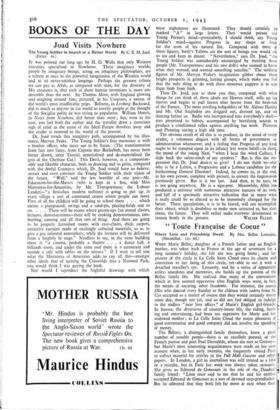BOOKS OF THE DAY
Joad Visits Nowhere
IT was pointed out long ago by H. G. Wells that only Western literature specialised in Nowhere& These imaginary worlds, people by imaginary beings, acting on imaginary philosophies, are a tribute at once to the powerful imagination of the Western world and to its never-satisfied longings. Perhaps the greatest tribute we can pay to Allah, as compared with man for the diversity of His creatures is, that each of these human inventions is more un- desirable than the next. Sir Thomas More, with England glowing and erupting around him, pictured, in his Utopians a nation of the world's most insufferable prigs. Bellamy, in Looking Backward, did as much as anyone in the world to horrify people at the thought of the Socialist polity he was trying to popularise. William Morris, in News from Nowhere, did better than most ; but, even in his case, you feel both the author and the traveller draw a conscious sigh of relief as the scene of the Ideal Future dissolves away and the reader is restored to the world of the present.
Dr. Joad treads this imaginary path, accompanied by his illus- trator, Mervyn Peake. The Young Soldier's first encounter is with a brother officer, who turns out to be Satan. (The transformation from fact into fancy, from Captain into Beelzebub, has never been better drawn since Tenniel materialised and de-materialised the grin of the Cheshire Cat.) This Devil, however is a companion- able and likeable character, both in drawing and in print, compared with the Awful Creatures which, Dr. Joad would have us believe, attract and even convince the Young Soldier with their vision of the future. "Well," said the less horrible of one pair—Mr. Education-for-the-Masses (who is kept in a box, with Miss 1VIinistress-for-Amenities, by Mr. Transportouse, the Labour Leader)—" a first-class modern architect is going to put up in every village a sort of communal centre where people can meet. First of all the children will be going to school there . . . which means a playground, swings and a sand-pit, playing-fields and so on. . . . There will be rooms where grown-ups can attend classes, lectures, demonstrations—there will be cooking demonstrations, jam- bottling, canning and all that sort of thing. And there are going to be properly furnished rooms with easy-chairs, thick carpets, attractive curtains made of excitingly coloured materials, so, as to give a gay informal atmosphere, while the lectures will be delivered from a brightly lit stage." Needless to say, in the same building there is "a cinema, probably a theatre . . . a dance hall, a billiards room, and under the same roof there is a restaurant and outside a café with tables on the terrace." If I were to tell you what the Ministress of Amenities adds to cap all this—amongst other ideals that of turning the Cotswolds into a National Park, you would think I was guying the book.
Nor would I reproduce the frightful drawings with which these nightmares are illustrated. They should certainly be marked " A " in large letters. They would poison any Young Person's mind—particularly, I should think, any Young Soldier's mind—against Progress in any shape or form for the term of his natural life. Compared with most of these figures, Swift's Yahoos are the sort of beings you would ask to tea and keep to dinner. - "Nevertheless," says Dr. Joad, "the Young Soldier was considerably encouraged by meeting three people (Mr. Transportouse and his two dolls) who seemed to know what they wanted, and wanted something sensible." The sardonic figures of Mr. Mervyn Peake's imagination gibber about these bright prospects in grinning, leering groups, which make you feel that the only thing to do with these atrocious puppets is to tear them limb from limb.
Then Dr. Joad, just to show you that, compared with other things he can think of, these ideals are Heaven itself, rolls up his sleeves and begins to pull horror after horror from the bran-tub of the Future. The more startling hobgoblins of Mr. Aldous Huxley and Mr. Olaf Stapledon are dragged out, dressed up, and set dancing before us. Radio sets incorporated into everybody's skull— toys presented to babies, accompanied by horrifying sounds to produce a conditioned reflex against anything but work. Planners and Planning having a high old time.
The obvious result of all this is to produce, in the mind of every reader, a vehement disgust with all forms of government or administration whatsoever, and a feeling that Progress of any kind ought to be stamped upon in its infancy lest worse befall—in short, the mood of the young Nazi, "when I. hear the word Culture, I slide back the safety-catch of my revolver." But is this the im-
pression that Dr. Joad desires to give? I do not think so—else why is he a Leftist, a Progressive and a Labour candidate for the
forthcoming General Election? Indeed, he comes in, at the end,
in his own person, complete with picture, to correct the impressions previously given. But it is too late. And then, as he says, he is not going anywhere. He is a sign-post. Meanwhile, Allah has
produced a universe with numerous attractive features of its own, and full of a speciously attractive indication that in many ways
it really could be so altered as to be immensely changed for the better. These speculations, it is to be feared, will not accomplish their object, which is doubtless to make men attracted to, but alert about, the future. They will rather make everyone determined to


























 Previous page
Previous page